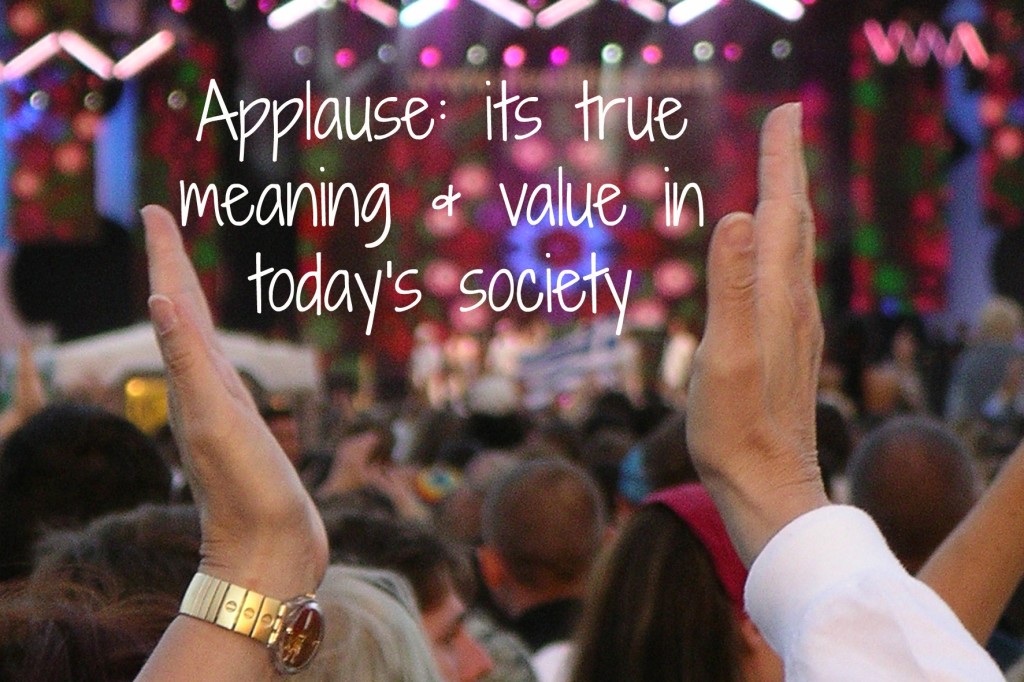Political speeches weren’t always about vocal audience reaction and applause. Now, however, one of the main ways that we show our appreciation and approval is with applause. Speeches are written with deliberate pauses to give the audience the opportunity to applaud partway along.
President Obama can hardly finish a sentence without the crowd breaking into applause. He can’t even blow his nose in public without being applauded for it. In fact, we often measure the success of a speaker by the round of applause that they receive at the end of their speech. The media jumps on it because it is such a tangible indicator of how the audience feels.
Applause in our daily lives
Applause is visible in other areas of life as well. When there’s turbulence in the air and the pilot of a plane manages to land it safely, the passengers will show their gratitude with applause. For long-anticipated movies, the hype that surrounds the film often leads to applause at the end of it (though this usually pertains only to opening-night showings at a movie theatre). Applause at the end of a stage theatre production is always expected, so to show even more appreciation, people do a standing ovation for the actors bowing on stage. Even this, however, has become increasingly more common, because of our habit of applauding over minute events.
One of the problems with applause is that it is used so frequently. The meaning of it has changed. It is expected; it is almost mandatory. In our society, if there is no applause, then something has gone seriously wrong with the rhetorician’s speech or performance. Sometimes, for example if an actor on stage forgets their lines, the audience sympathizes so much with the humiliation that the actor must be feeling that they applaud even louder to compensate. Thus it loses its “rewarding” aspect; the value of applause decreases.
Applause is loud and easy to do. All it takes is the simple act of pressing one’s hands together with some measure of force and speed (though even a considerable amount of force and speed are not necessary, especially if there is a very large crowd of people). It’s a way for the audience to give back to the performer: applause signals agreements and support. It is interesting, then, to consider why we applaud when the performer clearly cannot see or hear us, such as in the movie theatre. In this case, we are not applauding for the performer. Instead, we are either applauding to assert our own position so that others can see what we think of the performance, or we applaud to show that we are a part of the appreciative group, when everyone around us is applauding.
It is rare that we will be in a group of people with everyone else applauding and we are not. The pressure causes us to start clapping, too. If we don’t clap, everyone wonders why we are not appreciating the same thing that they are. Because of this, applause is also an automatic response of our society. It is a way to identify with the group so that we are not separated from our peers. Applauding, and a lack of applause, are both measures of our values and identities as individuals and as a group.

I’d be interested to know if there are any cultures where people don’t applaud – where appreciation is signalled, if at all, in some completely diffferent way. Presumably it’s ubiquitous now, but I wonder if it was, say even 100 years ago?
Another interesting question (to me, at any rate!) is the relationship between applause and the slow handclap. They signal almost opposite meanings (though the slow handclap is more often used for impatience than disapproval) but the only real difference between them is the beat. Curious, no?
And finally – when you say it’s ‘almost’ mandatory, at times it literally has been. I’ve read somewhere that officials / fellow politburo used to applaud Stalin sometimes literally until they fainted, because no one wanted to be seen to be the first to stop. Scary.
Anyway – great post! Round of applause!
You can look to variants, like the beatnick snapping of fingers at poetry. Despite the attempt to defy society with the variant, it’s really just a “new clap”. In polite company, you “golf clap”. If you’re at a sporting event, you might hoot and hollar. Using any of these out of context would give out extremely different signals. Cat-calling Obama might end up with the secret service guys tackling you, and taking you out behind the chemical shed to be shot. “Golf clapping” at a metal concert is likely to get you punched in the face by a mosher. The way we demonstrate the expected appreciation in society is almost as important as what we’re doing it towards.
Despite the automatic quality of applause though, sometimes even spawned from neon signs to instruct us, anybody who’s been applauded for is aware of the power behind it. There’s a strong emotional appeal to having the direct approval of the masses.
Liz- That’s fascinating! All of it. I’d be really interested to know the answers to some of those questions, too. It seems like such a simple, everyday thing, yet it really has enormous implications behind it.
Richard- heh, good point. The way that we conduct our applause carries with it a whole new host of meanings. And it certainly says a lot about power.
This is the best post you’ve written yet.